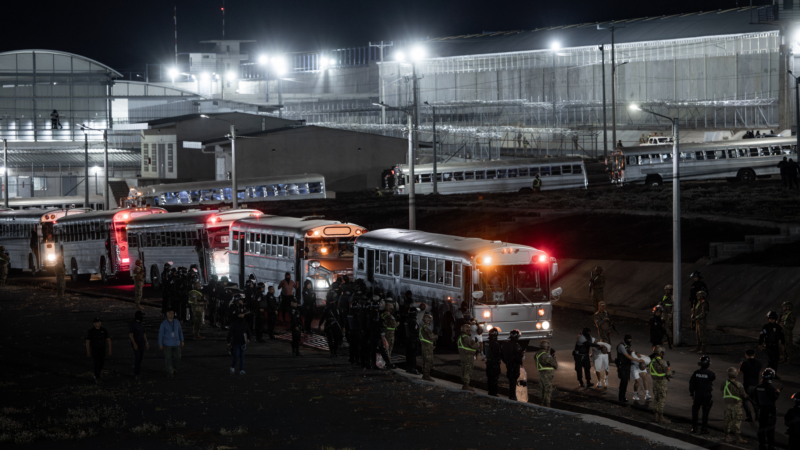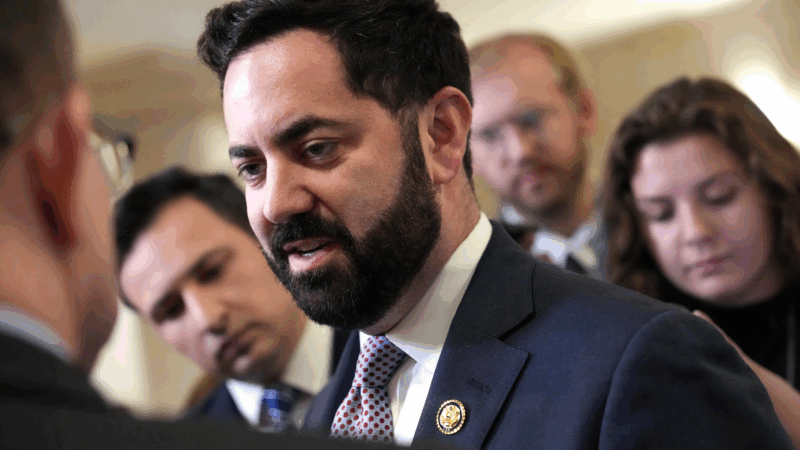Court hearing to test legality of deportations under 18th century law
Government lawyers are expected back in court on Friday to debate the legality of President Trump’s proclamation of the Alien Enemies Act.
Trump invoked the 1798 law last weekend to target members of Tren de Aragua, a Venezuelan prison gang he says is invading the U.S.
Judge James Boasberg, a federal district judge in Washington, D.C., blocked immediate deportations under the law in response to a lawsuit brought by immigrant rights groups, and ordered the government to turn around any planes already in the air. But three flights of more than 250 people deported from the U.S. still ended up in El Salvador the same evening.
Friday’s hearing over the merits of Boasberg’s temporary restraining order comes as the case has become a flashpoint between the judiciary and executive branches, with some Republican officials accusing Boasberg of overreach and calling for his impeachment.
Boasberg has questioned the government over whether the flights of detainees to El Salvador defied his order.
And for a week, the administration has declined to provide all the information he requested about the flights.
In a legal filing on Thursday afternoon, Boasberg called the government’s latest response to whether it had violated his judicial order “woefully insufficient” and said the government “again evaded its obligations.”
The Justice Department, meanwhile, says “the court’s superfluous questioning of sensitive national security information is inappropriate judicial overreach.”
While Friday’s hearing is about the underlying case, questions about compliance with Boasberg’s orders could come up as well.
Court filings escalate
White House press secretary Karoline Leavitt earlier this week provided a breakdown of the 261 people on the three flights, saying 137 were deported under the Alien Enemies Act, 101 were Venezuelans deported under regular immigration proceedings, and 23 were members of the MS-13 gang.
It is unclear which of the three planes carried the 137 alleged Tren de Aragua members.
And the Justice Department has so far declined to provide all the details the judge requested.
In an emergency filing on Wednesday, for example, lawyers wrote that the case has “devolved into a picayune dispute over the micromanagement of immaterial fact finding,” and warned it could open the door to “unnecessary judicial fishing expeditions.”
In a separate appeal to the D.C. Circuit, the Justice Department also requested that Boasberg be removed from the case.
In the meantime, lawyers told Boasberg that the administration is evaluating “whether to invoke the state secrets privilege” with regard to the flight details the court wants, they said. Such a privilege allows executive branch officials to refuse to provide evidence in a court case if they say it could harm national security or foreign relations.
Boasberg on Thursday gave lawyers until Friday morning to provide more details about the administration’s discussions on using the state-secrets privilege, and to make a final declaration on whether they’re going to invoke the privilege of state secrets by March 25. He also asked the government, yet again, to explain why the two flights that departed on March 15 did not violate his emergency block on deportations under the Alien Enemies Act.
Trump attacks Boasberg directly
Trump himself called Boasberg a “radical left” judge and “a lunatic,” suggesting during an interview with Fox News’ Laura Ingraham earlier this week that he was looking for publicity.
“We have bad judges — we have very bad judges — and these are judges that shouldn’t be allowed. I think at a certain point you have to start looking at what do you do when you have a rogue judge?” Trump said.
Trump also posted on Truth Social about how the “crooked judges” acting against him on immigration should be impeached, in what appeared to be a reference to Boasberg.
White House Deputy Chief of Staff Stephen Miller told reporters on Wednesday the administration as a whole stands by Trump’s comments about Boasberg.
“You cannot have a democracy where single, individual district court judges can assume the full, total powers of the commander in chief,” Miller said.
Greetings from Chiloé Island, Chile, where the fast-moving tides are part of local lore
Far-Flung Postcards is a weekly series in which NPR's international team shares moments from their lives and work around the world.
GOP House Rep. says it’s ‘unacceptable’ to allow ACA subsidies to expire
Rep. Mike Lawler says House Speaker Mike Johnson is correct in saying the health care system isn't working, but allowing ACA subsidies to expire without a plan to address rising costs is "idiotic."
Trump’s BBC lawsuit: A botched report, BritBox, and porn
President Trump's lawsuit alleges that the BBC's fall 2024 documentary was "a brazen attempt" to harm his re-election. The BBC has apologized but rejects his claim.
The best movies and TV of 2025, picked for you by NPR critics
Whether you plan to head out to the theater or binge from the couch, our critics have gathered together their favorite films and TV shows of 2025.
Recent attacks have been ‘inspired’ by Islamic State. What does that mean?
A decade ago, the self-proclaimed Islamic State group held vast swaths of territory across Iraq and Syria, but President Trump declared it destroyed in 2019.
How the long-running Obamacare fight came to thwart enhanced subsidies in Congress
Congress is poised to leave for a scheduled holiday recess without a solution for addressing the expiration of enhanced subsidies for Affordable Care Act marketplace plans.








